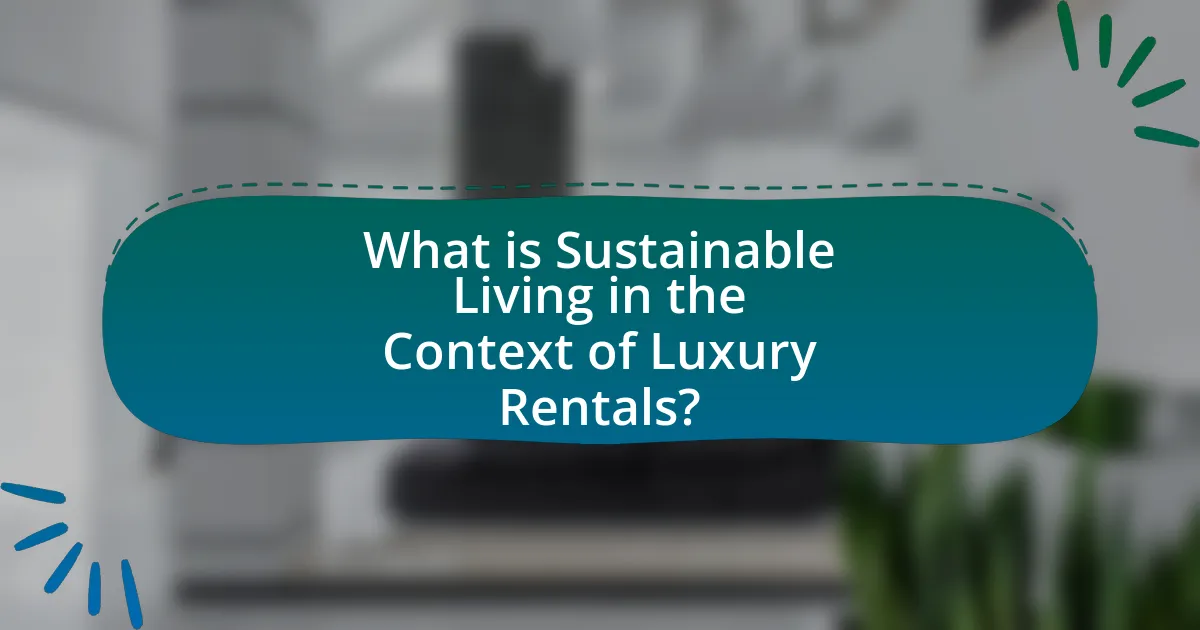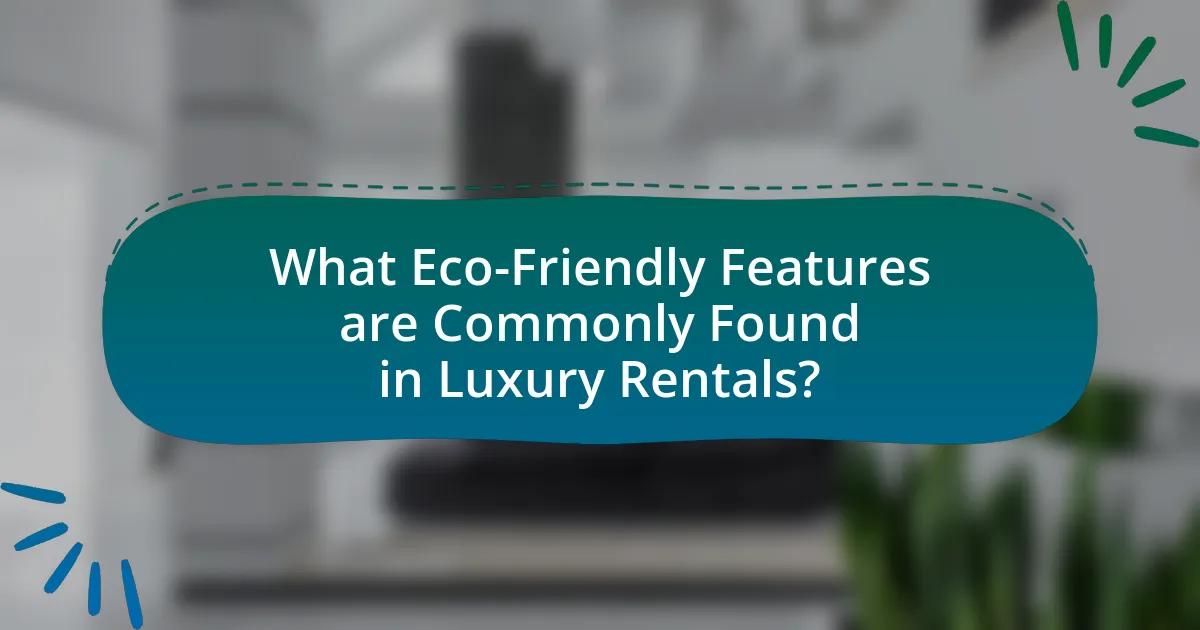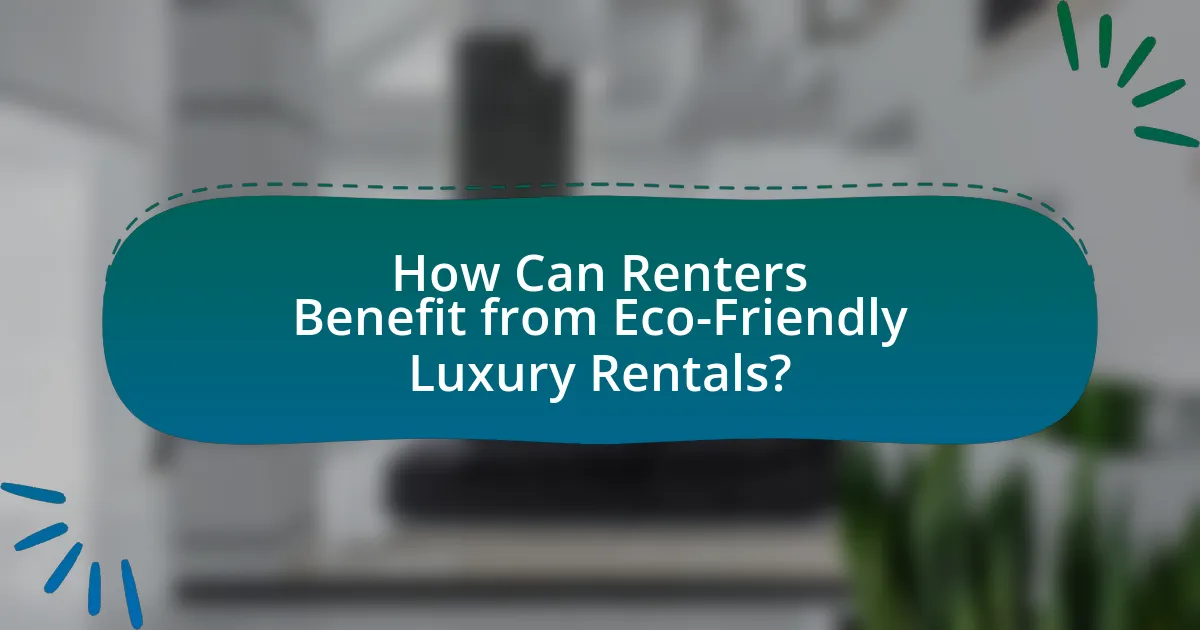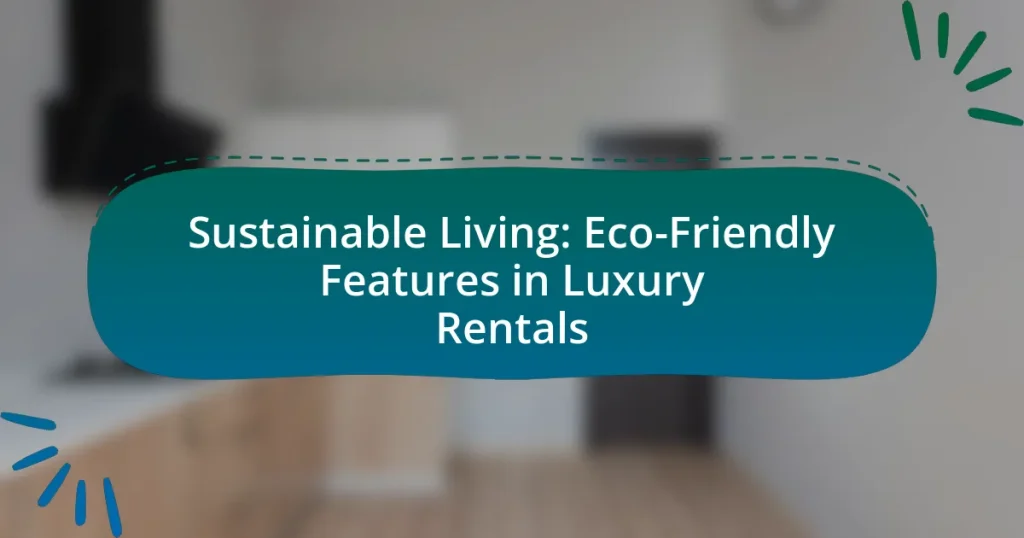Sustainable living in luxury rentals integrates eco-friendly practices and features to minimize environmental impact while providing a high-end experience. Key principles include energy efficiency, water conservation, and the use of sustainable materials, which enhance property value and attract environmentally conscious tenants. Luxury rentals often incorporate energy-efficient appliances, renewable energy sources, and waste reduction strategies, addressing significant environmental impacts such as carbon emissions and resource depletion. The article explores how these sustainable practices not only benefit the environment but also offer financial advantages and improve the quality of life for renters, making eco-friendly luxury rentals increasingly desirable in today’s market.

What is Sustainable Living in the Context of Luxury Rentals?
Sustainable living in the context of luxury rentals refers to the integration of eco-friendly practices and features within high-end rental properties to minimize environmental impact while providing a luxurious experience. This includes the use of renewable energy sources, sustainable materials, water conservation systems, and energy-efficient appliances, which not only reduce carbon footprints but also enhance the overall appeal of luxury accommodations. For instance, properties that utilize solar panels can significantly lower energy costs and emissions, aligning with the growing consumer demand for sustainability in the luxury market.
How does sustainable living influence luxury rental properties?
Sustainable living significantly influences luxury rental properties by driving demand for eco-friendly features and energy-efficient designs. Luxury renters increasingly prioritize sustainability, seeking properties that incorporate renewable energy sources, such as solar panels, and sustainable materials, like reclaimed wood and low-VOC paints. According to a 2021 survey by the National Association of Realtors, 66% of homebuyers expressed a preference for energy-efficient homes, indicating a strong market trend that luxury rentals must adapt to. This shift not only enhances property value but also attracts environmentally conscious tenants willing to pay a premium for sustainable amenities.
What are the key principles of sustainable living in luxury rentals?
The key principles of sustainable living in luxury rentals include energy efficiency, water conservation, sustainable materials, waste reduction, and promoting local ecosystems. Energy efficiency is achieved through the use of high-quality insulation, energy-efficient appliances, and smart home technology, which can reduce energy consumption by up to 30% (U.S. Department of Energy). Water conservation is implemented through low-flow fixtures and rainwater harvesting systems, which can significantly decrease water usage. Sustainable materials, such as reclaimed wood and recycled metals, are prioritized in construction and furnishings to minimize environmental impact. Waste reduction strategies involve composting and recycling programs, which can divert up to 75% of waste from landfills (EPA). Lastly, promoting local ecosystems can be accomplished by incorporating native landscaping and supporting local businesses, enhancing biodiversity and community sustainability.
How do luxury rentals incorporate sustainable living practices?
Luxury rentals incorporate sustainable living practices by utilizing eco-friendly materials, implementing energy-efficient systems, and promoting waste reduction. Many luxury properties are designed with sustainable architecture, featuring renewable resources such as bamboo flooring and recycled materials in construction. Energy-efficient appliances and smart home technologies are commonly installed to minimize energy consumption, with some rentals achieving certifications like LEED (Leadership in Energy and Environmental Design). Additionally, luxury rentals often provide recycling programs and encourage guests to participate in local sustainability initiatives, reinforcing their commitment to environmental responsibility.
Why is sustainable living important for luxury rentals?
Sustainable living is important for luxury rentals because it enhances property value and attracts environmentally conscious consumers. Luxury rentals that incorporate eco-friendly features, such as energy-efficient appliances and sustainable materials, not only reduce operational costs but also appeal to a growing market segment that prioritizes sustainability. According to a 2021 report by the Global ESG Benchmark for Real Assets, properties with sustainable certifications can command rental premiums of up to 20%. This trend indicates that integrating sustainable practices is not just beneficial for the environment but also economically advantageous for luxury rental owners.
What environmental impacts are addressed by sustainable luxury rentals?
Sustainable luxury rentals address several environmental impacts, primarily focusing on energy efficiency, water conservation, and waste reduction. These rentals often incorporate renewable energy sources, such as solar panels, which significantly lower carbon emissions associated with traditional energy use. Additionally, they utilize water-saving fixtures and appliances to minimize water consumption, contributing to the preservation of local water resources. Furthermore, sustainable luxury rentals implement waste management practices, including recycling and composting, to reduce landfill contributions. Collectively, these measures help mitigate climate change effects, conserve natural resources, and promote biodiversity.
How does sustainable living enhance the appeal of luxury rentals?
Sustainable living enhances the appeal of luxury rentals by attracting environmentally conscious consumers who prioritize eco-friendly practices. Luxury rentals that incorporate sustainable features, such as energy-efficient appliances, renewable energy sources, and sustainable materials, not only reduce environmental impact but also offer a unique selling proposition in a competitive market. According to a 2021 report by the Global Sustainable Investment Alliance, sustainable investments have grown to over $35 trillion, indicating a significant consumer shift towards sustainability. This trend demonstrates that luxury rentals with sustainable attributes can command higher prices and attract a discerning clientele willing to pay a premium for eco-friendly accommodations.

What Eco-Friendly Features are Commonly Found in Luxury Rentals?
Luxury rentals commonly feature eco-friendly elements such as energy-efficient appliances, solar panels, and sustainable building materials. These features not only reduce energy consumption but also minimize the environmental impact of the property. For instance, energy-efficient appliances can reduce electricity usage by up to 50%, while solar panels can significantly lower utility costs and carbon footprints. Additionally, many luxury rentals incorporate water-saving fixtures and smart home technology to optimize resource management, further enhancing their sustainability profile.
How do energy-efficient appliances contribute to sustainability?
Energy-efficient appliances contribute to sustainability by significantly reducing energy consumption and greenhouse gas emissions. These appliances utilize advanced technology to operate using less electricity or gas compared to standard models, which leads to lower energy bills and a decreased carbon footprint. For instance, the U.S. Department of Energy states that energy-efficient appliances can save households up to 30% on energy costs, translating to a reduction of approximately 1,000 pounds of carbon dioxide emissions per year per household. By promoting the use of these appliances, we can enhance resource conservation and support a transition towards a more sustainable energy system.
What types of energy-efficient appliances are typically used?
Energy-efficient appliances typically used include ENERGY STAR-rated refrigerators, washing machines, dishwashers, and HVAC systems. These appliances are designed to consume less energy while maintaining performance, which contributes to lower utility bills and reduced environmental impact. For instance, ENERGY STAR-certified refrigerators use about 15% less energy than non-certified models, demonstrating significant energy savings. Additionally, energy-efficient washing machines can save up to 25% more energy and 45% more water compared to standard models, further supporting sustainable living practices in luxury rentals.
How do these appliances reduce energy consumption?
These appliances reduce energy consumption by utilizing advanced technologies such as energy-efficient motors, smart sensors, and optimized heating and cooling systems. For instance, Energy Star-rated appliances consume up to 50% less energy compared to standard models, significantly lowering electricity usage. Additionally, smart appliances can adjust their operation based on usage patterns, further enhancing efficiency and minimizing waste.
What role does sustainable building materials play in luxury rentals?
Sustainable building materials significantly enhance the appeal and value of luxury rentals by promoting environmental responsibility and energy efficiency. These materials, such as reclaimed wood, bamboo, and recycled metal, not only reduce the ecological footprint of the property but also attract environmentally conscious tenants willing to pay a premium for sustainable living options. According to a 2021 report by the World Green Building Council, buildings constructed with sustainable materials can achieve energy savings of up to 30%, which further increases their desirability in the luxury rental market.
Which sustainable materials are preferred in luxury construction?
Sustainable materials preferred in luxury construction include reclaimed wood, bamboo, recycled metal, and low-VOC (volatile organic compounds) paints. Reclaimed wood is favored for its aesthetic appeal and reduced environmental impact, as it repurposes existing materials rather than requiring new resources. Bamboo is a rapidly renewable resource known for its strength and versatility, making it an ideal choice for flooring and cabinetry. Recycled metal, often used in structural elements and roofing, minimizes waste and energy consumption associated with new metal production. Low-VOC paints contribute to healthier indoor air quality by reducing harmful emissions. These materials not only enhance the luxury aesthetic but also align with eco-friendly building practices, reflecting a growing trend in sustainable luxury construction.
How do these materials impact the overall sustainability of the property?
The materials used in a property significantly enhance its overall sustainability by reducing environmental impact and improving energy efficiency. Sustainable materials, such as bamboo, recycled steel, and reclaimed wood, minimize resource depletion and lower carbon emissions during production. For instance, bamboo grows rapidly and absorbs more carbon dioxide than traditional timber, making it a highly sustainable choice. Additionally, using recycled materials can divert waste from landfills, further promoting sustainability. According to the U.S. Green Building Council, buildings constructed with sustainable materials can achieve higher energy performance ratings, leading to reduced utility costs and a smaller ecological footprint.

How Can Renters Benefit from Eco-Friendly Luxury Rentals?
Renters can benefit from eco-friendly luxury rentals through reduced utility costs and enhanced living conditions. Eco-friendly luxury rentals often incorporate energy-efficient appliances, sustainable materials, and smart home technologies that lower energy consumption, leading to significant savings on electricity and water bills. Additionally, these properties typically feature improved indoor air quality due to the use of non-toxic materials and better ventilation systems, which can enhance overall health and well-being. Studies indicate that homes with energy-efficient features can save renters up to 30% on energy costs annually, making eco-friendly luxury rentals both economically and environmentally advantageous.
What financial advantages do eco-friendly luxury rentals offer?
Eco-friendly luxury rentals offer significant financial advantages, including reduced operational costs and increased property value. Properties equipped with energy-efficient appliances and sustainable materials often experience lower utility bills, which can lead to substantial savings over time. Additionally, studies indicate that eco-friendly homes can command higher rental prices; for instance, a report by the National Association of Realtors found that green homes can sell for 9-15% more than traditional homes. This premium reflects growing consumer demand for sustainable living options, enhancing the overall investment potential of eco-friendly luxury rentals.
How can energy savings affect rental costs?
Energy savings can lead to lower rental costs by reducing utility expenses for tenants, which can make properties more attractive and affordable. When a rental property incorporates energy-efficient features, such as high-efficiency appliances or improved insulation, it typically results in decreased energy consumption. According to the U.S. Department of Energy, energy-efficient homes can save tenants up to 30% on their energy bills. This reduction in monthly expenses can justify a lower rental price or make a property more competitive in the market, ultimately influencing landlords to adjust rental costs accordingly.
What incentives are available for choosing sustainable rentals?
Incentives for choosing sustainable rentals include financial benefits such as lower utility bills due to energy-efficient appliances and potential tax credits for using renewable energy sources. Many sustainable rentals are designed to reduce energy consumption, which can lead to savings of 10-50% on energy costs, according to the U.S. Department of Energy. Additionally, some local governments offer incentives like rebates for eco-friendly upgrades or grants for sustainable housing initiatives, encouraging renters to choose environmentally responsible options.
How does living in a sustainable luxury rental enhance quality of life?
Living in a sustainable luxury rental enhances quality of life by providing a healthier living environment and promoting well-being through eco-friendly features. These rentals often incorporate high-quality air filtration systems, natural lighting, and sustainable materials, which contribute to improved indoor air quality and overall comfort. Research indicates that access to green spaces and natural elements can reduce stress and enhance mental health, further elevating the living experience. Additionally, sustainable luxury rentals typically utilize energy-efficient appliances and renewable energy sources, leading to lower utility costs and a reduced carbon footprint, which aligns with the values of environmentally conscious residents.
What health benefits are associated with eco-friendly living environments?
Eco-friendly living environments provide numerous health benefits, including improved air quality, reduced exposure to harmful chemicals, and enhanced mental well-being. These environments often utilize non-toxic materials and sustainable practices, which contribute to lower levels of indoor pollutants. For instance, studies show that homes built with eco-friendly materials can reduce respiratory issues by up to 30% due to decreased volatile organic compounds (VOCs). Additionally, access to green spaces in eco-friendly settings has been linked to lower stress levels and improved mood, as evidenced by research published in the Journal of Environmental Psychology, which found that individuals living near parks reported higher life satisfaction.
How does sustainable living contribute to a sense of community?
Sustainable living fosters a sense of community by encouraging collaboration and shared values among residents. When individuals engage in eco-friendly practices, such as community gardening or recycling initiatives, they create opportunities for interaction and teamwork. Research indicates that neighborhoods with strong sustainability initiatives report higher levels of social cohesion and trust among residents, as seen in studies conducted by the Urban Sustainability Directors Network, which highlight the positive correlation between environmental initiatives and community engagement. This shared commitment to sustainability not only enhances relationships but also cultivates a collective identity, reinforcing the bonds within the community.
What are the best practices for choosing a sustainable luxury rental?
To choose a sustainable luxury rental, prioritize properties that utilize renewable energy sources, such as solar or wind power. These energy-efficient features significantly reduce carbon footprints and promote environmental responsibility. Additionally, verify that the rental incorporates sustainable materials in its construction and furnishings, such as reclaimed wood or recycled metals, which contribute to resource conservation. Look for certifications like LEED (Leadership in Energy and Environmental Design) or Green Key, which indicate adherence to rigorous sustainability standards. Researching the property’s water conservation systems, such as low-flow fixtures and rainwater harvesting, further ensures responsible resource management. Lastly, consider the location’s accessibility to public transportation and local amenities, which can minimize reliance on vehicles and enhance the overall sustainability of your stay.
How can renters identify eco-friendly features when searching for rentals?
Renters can identify eco-friendly features when searching for rentals by looking for specific attributes such as energy-efficient appliances, sustainable building materials, and certifications like LEED or Energy Star. Energy-efficient appliances reduce electricity consumption, while sustainable materials, such as bamboo flooring or recycled glass countertops, minimize environmental impact. Properties with LEED certification meet rigorous sustainability standards, ensuring a lower carbon footprint. Additionally, renters should inquire about water-saving fixtures, solar panels, and the overall energy efficiency rating of the property, as these features contribute to a more sustainable living environment.
What questions should renters ask landlords about sustainability practices?
Renters should ask landlords about the specific sustainability practices implemented in the property. Key questions include: “What energy-efficient appliances are installed?” which addresses the use of modern, eco-friendly technology; “Is the building constructed with sustainable materials?” to understand the environmental impact of the construction; “What waste management practices are in place?” to evaluate recycling and composting efforts; and “Are there any water-saving fixtures installed?” to assess water conservation measures. These inquiries help renters gauge the commitment of landlords to sustainability, supported by the fact that properties with energy-efficient features can reduce utility costs by 30% or more, according to the U.S. Department of Energy.


